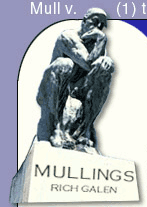
|
Parts I, II, & III: The Trip to Reagan National, Getting Through Reagan National, The Flight to Atlanta Part IV: Atlanta: The Home of the Braves and the Land of the Free Local Calls Part V: I Find the Lines Part VI: The Plane to Washington
Click here for an Easy Print Version 
|







